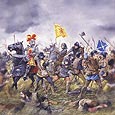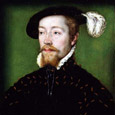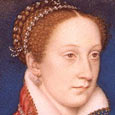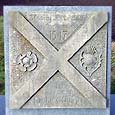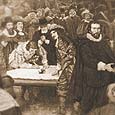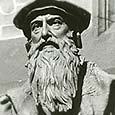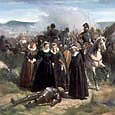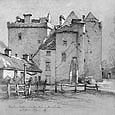Scotland’s Renaissance History
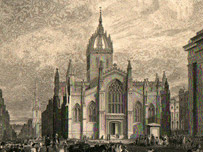
Scotland’s Renaissance History
In Italy a golden age of Invention and art had begun – in Scotland an age of religious intolerance and persecution replaced it. The poor relationship with tudor England resulted in the disaster of Flodden.
Mary, Queen of Scots emerged from this schism of church and state to become one of the nations most romantic and tragic characters.
1513 Battle of Flodden
Flodden was a disastrous and unnecessary confrontation for Scotland. James IV of Scotland was married to the sister of England’s King Henry VIII and a treaty of friendship existed between their countries.
» Continue to read about the 1513 Battle of Flodden
1542 Battle of Solway Moss
Following the success against the English at Haddon Rig in the August, James V gathered an army of ten thousand and sent them, under the command of Oliver Sinclair of Pitcairns, to push as far into England as they could.
» Continue to read about the 1542 Battle of Solway Moss
1542 Birth of Mary, Queen of Scots
Born on 8 December 1542, Mary’s life was complicated from the first week when her father, James V, died and made her Queen when she was six days old.
» Continue read about the birth of Mary, Queen of Scots
1547 The Battle of Pinkie
The Battle of Pinkie, on the banks of the River Esk on 10 September 1547, was another catastrophic waste of life encouraged by lack of discipline and weak command.
» Read about the 1547 Battle of Pinkie
1557 Signing of the Covenant
In 1557 a group of Protestant nobles opposed to Mary marrying the Roman Catholic Dauphin of France, signed a covenant to state that they would promote the ‘blessed work of God and his Congregation against the Congregation of Satan’, the former being the Protestants and the latter the Catholics.
» Continue to read about the signing of the Covenant
1559 John Knox Ordained
The most influential person of the Scottish Reformation, John Knox, was first ordained as a Catholic priest. Knox spent time in the company of George Wishart before he was arrested and burned for heresy in March 1546 by Cardinal Beaton.
» Continue to read about John Knox’s ordination
1568 Battle of Langside
Queen Mary’s reign was in tatters when she escaped from Loch Leven Castle on 2 May 1568. A week later she had gathered six thousand men willing to fight for her as she headed for the safety of her strong Dumbarton Castle, which Lord Fleming was holding for her.
» Continue to read about the 1568 Battle of Langside
1582 Ruthven Raid
In 1581, Esmé Stewart was created Earl of Lennox. He was in support of Queen Mary and acknowledged Catholic concerns at a time when the Reformation was well established in Scotland. The Presbyterians believed Lennox to be an agent for the Counter-Reformation and a Catholic spy.
» Continue to read about the Ruthven Raid






